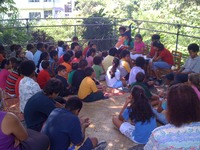A friend of mine, recently moved back to the US from Fiji, has pointed me to two articles related to education. They seem to have a common core in them which is something to do with the relevance of education for the children at the school.
Resilience
The first article is an account of a New York Times correspondent (Clifford Levy) who was posted to Moscow, Russia for a period of five years. Unusually, the parents decided to place their children into a private but completely Russian school. Their children had no Russian language and yet all the topics were conducted in Russian. The article describes how the children went from essentially depressed and 'culture shocked' children, to children who showed their resilience by assimilating themselves into the Russian school and making significant Russian friendships. The children having apparently not only learned the language but even gone onto be some of the higher grade scorers with their respective classes as well as representing the school in school competitions. As my friend says that the article:
Reinforces my belief that kids will always be able to handle living abroad and being forced to manage new cultures and languages. Anyone who would dare argue that this Russian experience hurt these children is a fool.
Please note that I'm not trying to say that the best way that children can grow up is to face adversity everyday. This article clearly makes the case that the the school was a progressive school who had a Principal who was passionate and sharp in what it means to be 'educated'. Furthermore he apparently took time to evaluate whether the correspondent's children would actually succeed at his school despite their lack of native Russian language skills. However, it is also clear that the children had to face significant adversity in order to successfully assimilate into the Russian culture of this unique school, but most of us parents do not give our children the respective challenges to allow them to rise to, and overcome this kind of adversity.
Character
The second article talks about the fact that schools may be so focussed on academic topics (literature, geometry and physics) that they forget the values that help us define what it means to be a fine upstanding citizen of our respective communities. Most of us hope that our children will be more than financially successful, but also 'decent' by showing honesty, moral fibre, diligence, keeping one's promises and so on. Indeed one of the qualities that we admire about entrepreneurs is their resilience to continue when everyone else appears to tell them to 'give up'
Some may say that such aspects of a person may be desirable but they do have no place in secular education.
Yet this article clearly highlights research from positive psychology, that demonstrates that often 'good character' can in fact be a better index of future 'happiness' and a higher quality of life.
Really we should be asking whether good character is something that needs to be encouraged to develop (suggesting that we all have it to some degree and it's a question of letting it out) or whether it's actually something that's teachable?
For the moment at the Multiple Intelligence School we have taken a 'hedge our bets' approach.
First of all, we tend to discuss 'virtues' on a weekly basis. Of course they tend to recycle a few times but this isn't such a bad thing, after all how many times as parents do we have to repeat ourselves "Dear, please pick up the detritus you've strewn around the house!". However, each of the teachers tries to incorporate the virtues in their teaching. This could be very artificial, so instead the teachers tend to be opportunistic in weaving the virtue into their teaching. Normally it's just a question of being sensitive to an opportunity and then they tend to pick up on it quite naturally. We're definitely on the 'teach' approach when we do this.
Secondly we try to quick off the mark to encourage, cajole, or eventually demand that children show mutual respect both to other children and then to the teaching staff. A child at MIS, could be bullied, but not for long. We tend to nip incidents in the bud before it becomes a major 'I hate you!' fest. Now some may say that this doesn't prepare our children for the 'real' world where there is 'teacher' to prevent cruel and taunting remarks. However, like all progressions, one starts out gently at first and then as they move through our system, the environment becomes more realistic. This approach could be in the 'we can teach this camp' but could also be in the 'let it out' one.
MIS Meetings
Children sit in a school meeting. The facilitator (chairperson) wears a big pointed hat and children can only speak if they are given the 'talking stick'. Some issues of 'poor' character behaviour is brought up in these meetings and some restorative justice issues have been resolved at these meetings.

Finally, we're embarking on what we believe is one of the first, if not the first attempts in Fiji, at having our children deal with restorative justice in our school meetings. These meetings are quite unique because they are actually run by the children. We're moving cautiously into this but we have taken our inspiration from Summerhill School in the UK. This is the kind of initiative that if done correctly helps children to learn at an early age, the consequences of 'good' and 'bad' behaviour that speaks to character rather than simply academic excellence.
Vinaka Jonathan for these great articles.